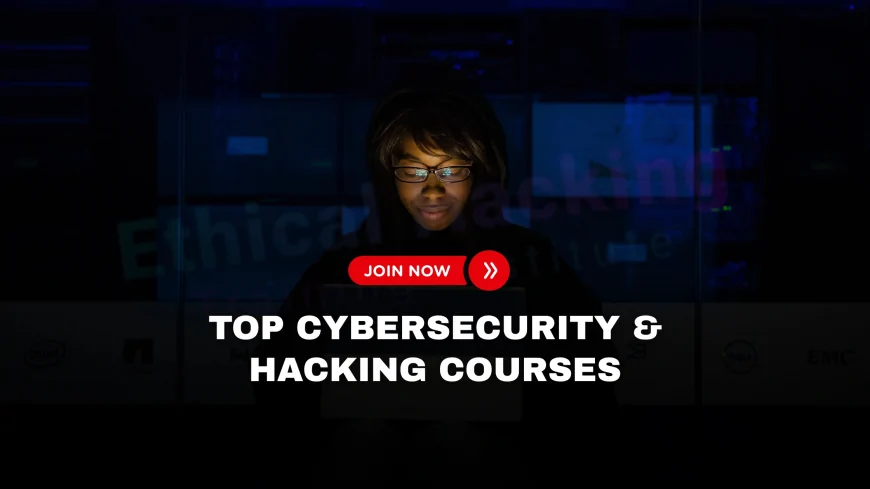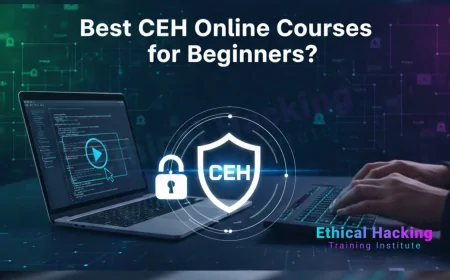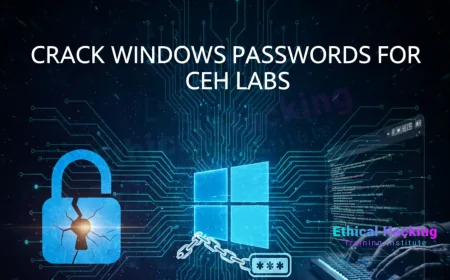Cyber Security and Hacking Courses: The Best Programs for Career Advancement in 2025 | Cybersecurity & Hacking Certification Programs to Accelerate Your Career in 2025
Explore the top cyber security and ethical hacking courses for 2025. Learn skills like penetration testing, cloud security, and malware analysis to advance your career in cybersecurity.

Table of Contents
- Introduction
- Industry Trends in 2025
- Why Enroll in Cyber Security Courses?
- Top Cyber Security Courses for 2025
- Certified Ethical Hacker (CEH v13)
- Offensive Security Certified Professional (OSCP)
- CompTIA Security+ & PenTest+
- eLearnSecurity eMAPT & eWPT
- TryHackMe & Hack The Box
- Cybrary Cyber Career Paths
- Coursera & edX Specializations
- Course Comparison Table
- Key Skills You'll Gain
- Industry Certifications
- Essential Tools & Platforms
- Recommended Learning Path
- Career Benefits & Salary Outlook
- Tips to Succeed in Cyber Security Training
- Frequently Asked Questions (FAQs)
- Conclusion
Introduction
The cyber security industry is transforming at breakneck speed in 2025. With cyber threats evolving through AI-based malware, ransomware-as-a-service, and deepfake attacks, the demand for skilled professionals has reached an all-time high. Whether you're a newcomer, IT professional, or experienced veteran, enrolling in expert-designed cyber security or ethical hacking courses is critical to advancing your career.
This article uncovers the best programs in 2025 that combine certification, live labs, mentorship, and real-world simulations to equip you with cutting-edge defense and offensive skills.
Industry Trends in 2025
- AI-driven cyber threats: Malware now exploits generative AI, necessitating adaptive defense strategies.
- Zero Trust adoption: Organizations increasingly deploy Zero Trust architectures, requiring expertise in micro-segmentation and identity-driven access.
- Cloud-native security: Cloud workload protection (e.g., CSA, CISM) and container security (e.g., Kubernetes) are top priorities.
- Mobile & IoT vulnerabilities: Security specialists must address threats across smartphones, wearables, and connected devices.
Why Enroll in Cyber Security Courses?
- Skill validation: Certifications and lab-based training prove your abilities to employers.
- Hands-on competence: Virtual labs simulate real-world incidents—from exploit chaining to incident response.
- Career acceleration: Certifications often lead to higher salaries and promotion potential.
- Community & mentorship: Peer forums, Slack channels, and instructor-led office hours provide support and networking.
Top Cyber Security Courses for 2025
Certified Ethical Hacker (CEH v13)
The CEH v13 from EC-Council remains a foundational ethical hacking certification. It covers system penetration, footprinting, scanning, defense evasion, and threat management.
Structure: 40–60 hours of theory + lab work via EC-Council iLabs.
Best for: IT pros, network engineers, SOC analysts seeking credibility in ethical hacking.
Offensive Security Certified Professional (OSCP)
Offered by Offensive Security, the OSCP is an intensive hands-on certification designed for advanced penetration testers.
Includes: 24/7 access to Practice Labs, a challenging 24-hour certification exam involving a real-world multi-machine penetration test.
Best for: Professionals aiming to demonstrate real-world offensive expertise.
CompTIA Security+ & PenTest+
Vendor-neutral certifications: Security+ covers foundational cybersecurity; PenTest+ dives into network scanning, vulnerability assessment, and exploitation.
Ideal for: Beginners and intermediate learners preparing for more advanced courses.
eLearnSecurity eMAPT & eWPT
eMAPT (Mobile Application Pen Tester) focuses on mobile application security, including reverse engineering and OWASP Mobile Top 10. eWPT (Web Penetration Testing) addresses web app vulnerabilities.
Includes: Real labs + certification exams.
TryHackMe & Hack The Box
Platform-based learning: practice capture‑the‑flag (CTF) challenges, red/blue ops, and structured learning paths from beginner to expert.
Advantages: Instant feedback, community engagement, gamification.
Cybrary Cyber Career Paths
Offers personalized learning tracks for roles like SOC Analyst, Blue Team Defender, Pentester, and Cloud Security Specialist. Includes labs, quizzes, and career mentoring.
Coursera & edX Specializations
Academic-style specializations developed by top universities (e.g., Stanford, University of Maryland, University of Michigan) covering cyber defense, forensics, and ethical hacking. Includes capstone projects.
Course Comparison Table
| Platform/Certification | Target Skill Level | Delivery Mode | Hands-on Labs | Certification Included | Estimated Cost |
|---|---|---|---|---|---|
| EC-Council CEH v12 | Intermediate | Instructor‑led/Self‑paced | Yes (iLabs) | Yes | ₹50k–₹75k |
| Offensive Security OSCP | Advanced | Self-paced + Certification Exam | Yes | Yes | ₹90k+ |
| CompTIA Security+ / PenTest+ | Beginner / Intermediate | Self‑paced | Some labs | Yes | ₹20k–₹40k |
| eLearnSecurity eMAPT / eWPT | Intermediate–Advanced | Self‑paced + Exams | Yes | Yes | ₹40k–₹60k |
| TryHackMe / Hack The Box | All Levels | Self‑paced | Yes | No | ₹750–₹1,200/month |
| Cybrary | All Levels | Self‑paced + Mentoring | Yes | No / Some | ₹5k–₹15k/month |
| Coursera / edX | Beginner–Advanced | Self‑paced + Projects | Some/simulated | Yes | ₹10k–₹25k |
Key Skills You'll Gain
- Advanced penetration testing (red team, CTF, OSINT)
- Vulnerability assessment & mitigation
- Secure network design & Zero Trust implementation
- AI‑driven threat detection & response
- Digital forensics & incident response (DFIR)
- Cloud security (AWS, Azure, GCP)
- Mobile & IoT security testing
- Scripting & automation (Python, Bash, PowerShell)
Industry Certifications
- CEH v12 (Certified Ethical Hacker)
- OSCP / OSCE (Offensive Security)
- CompTIA Security+, PenTest+
- eMAPT, eWPT (eLearnSecurity)
- SANS GIAC (GSEC, GPEN, GWAPT)
- CISSP (ISC²) for mid/senior roles
Essential Tools & Platforms
- Kali Linux / Parrot OS
- Metasploit, Nmap, Burp Suite
- Wireshark, Splunk, ELK Stack
- Fuzzing tools: AFL, Burp Advanced
- Mobile tools: MobSF, Frida, Drozer
- Cloud tools: AWS Inspector, Azure Defender
- Forensics: Autopsy, Volatility, SIFT
Recommended Learning Path
- Beginner: Start with Security+ and introductory TryHackMe paths.
- Intermediate: Move to CEH and PenTest+ for fundamental hacking methods.
- Advanced: Enroll in OSCP or eWPT/eMAPT for deep technical mastery.
- Specialization: Pursue mobile, cloud, forensics, or malware focus.
- Capstone: Build a CTF portfolio, contribute to open-source projects, or complete university-level projects.
Career Benefits & Salary Outlook
Cybersecurity professionals are among the highest-paid IT experts. Here's a snapshot for India:
- Entry-level: ₹4–8 LPA
- Certified intermediate: ₹9–20 LPA
- Senior experts: ₹25–50 LPA+
Popular roles: Penetration Tester, Security Architect, SOC Engineer, Forensic Analyst, Cloud Security Specialist, Threat Intelligence Analyst.
Tips to Succeed in Cyber Security Training
- Create a home lab with VMs (VirtualBox, VMware) and networking setups.
- Engage with peers—Discord, Slack, CTF teams, GitHub.
- Practice continuously via CTFs, bug bounty programs, and open-source tools.
- Document your work—write blog posts and produce detailed reports.
- Stay updated by following top security blogs, OSINT newsletters, and vulnerability disclosures.
Frequently Asked Questions (FAQs)
1. What is the difference between CEH and OSCP?
CEH provides theoretical and broad ethical hacking coverage, while OSCP emphasizes real-world, hands-on penetration testing with rigorous exams.
2. Which course is best for beginners?
CompTIA Security+ and beginner tracks on TryHackMe or Cybrary are ideal for starting in cyber security.
3. Is hands-on practice necessary?
Yes—virtual labs and continuous practice are critical to mastering cyber defense and offense skills.
4. Can I learn cyber security without a degree?
Absolutely—skills, certifications, and practical experience matter more than a formal degree.
5. How long does it take to get certified?
Foundational certifications can take 1–3 months. Advanced programs like OSCP may require 6–12 months of study.
6. Are cyber security certifications worth the cost?
Yes, most certifications offer strong ROI through higher salaries, job opportunities, and credibility.
7. Do these programs help with job placement?
Many platforms and bootcamps offer mentorship, resume reviews, and placement assistance.
8. What if I cannot code?
Start with basics (Python/Bash). Courses typically include scripting modules to build your skills gradually.
9. Can I specialize after the general course?
Yes. After foundational trainings, you can focus on cloud, mobile, forensics, malware analysis, or red teaming.
10. How do I choose between self-paced and instructor-led?
Self-paced suits flexible learners. Instructor-led offers structured schedules and direct feedback—choose based on your learning style.
11. Is OSCP the toughest certification?
It's among the most rigorous practical certs, demanding strong dedication, planning, and technical competence.
12. Are TryHackMe and HTB enough for job readiness?
They provide practical skills and CTF exposure, but pairing them with certifications boosts employability.
13. How can I practice cloud security?
Use AWS/Azure free tiers and cloud-focused labs on Cybrary, TryHackMe, and Coursera specializations.
14. Do I need special hardware?
A capable laptop with virtualization (8GB+ RAM) is sufficient; cloud labs can supplement any missing resources.
15. Can I freelance as a freelance pentester?
Yes—use certs, labs, and completed CTFs to build your portfolio and connect with bug bounty programs.
16. What tools should I master first?
Start with Nmap, Wireshark, Burp Suite, Metasploit, and then explore cloud and mobile tools as you specialize.
17. Are cybersecurity jobs available remotely?
Yes—many roles such as SOC analyst, penetration tester, and security consultant offer fully remote options.
18. How do I stay updated?
Follow security news (e.g., KrebsOnSecurity), vulnerability lists (CVE), and attend webinars and conferences.
19. What is incident response?
Incident response involves managing and mitigating live cyberattacks, including forensic investigation and system recovery.
20. Which course is best for cloud security?
Look into Coursera’s cloud security specializations, Cybrary’s cloud paths, or vendor certs like AWS Certified Security Specialty.
Conclusion
In 2025, cyber security is no longer optional—it’s foundational. The programs listed here span foundational courses to advanced, specialized tracks, enabling you to build a robust career. Certification, hands-on labs, and structured mentorship set you apart. Whether you're just beginning or aiming for elite positions, these programs provide the path. Invest in your future now and stand strong against evolving cyber threats.
What's Your Reaction?
 Like
0
Like
0
 Dislike
0
Dislike
0
 Love
0
Love
0
 Funny
0
Funny
0
 Angry
0
Angry
0
 Sad
0
Sad
0
 Wow
0
Wow
0

















